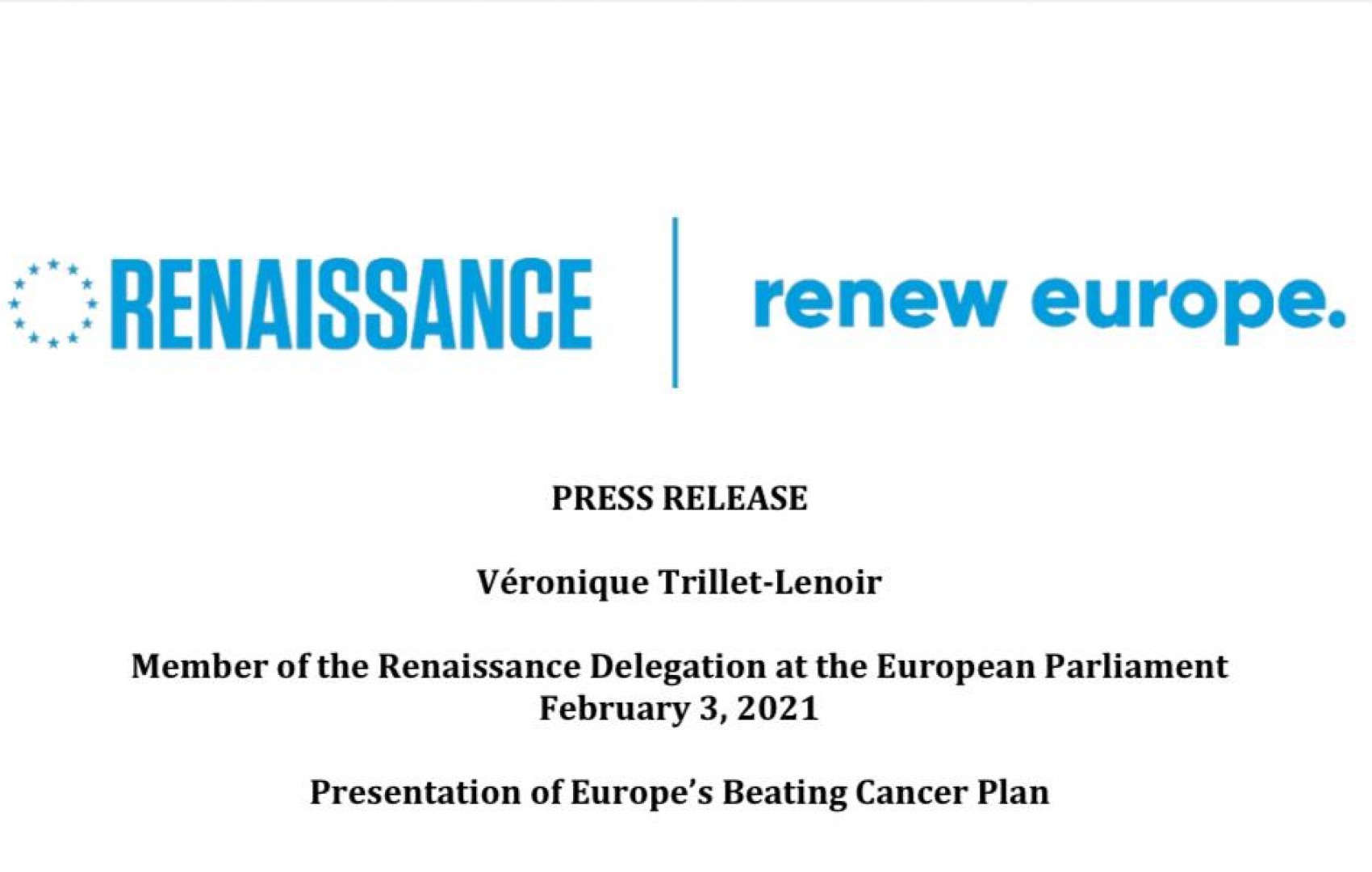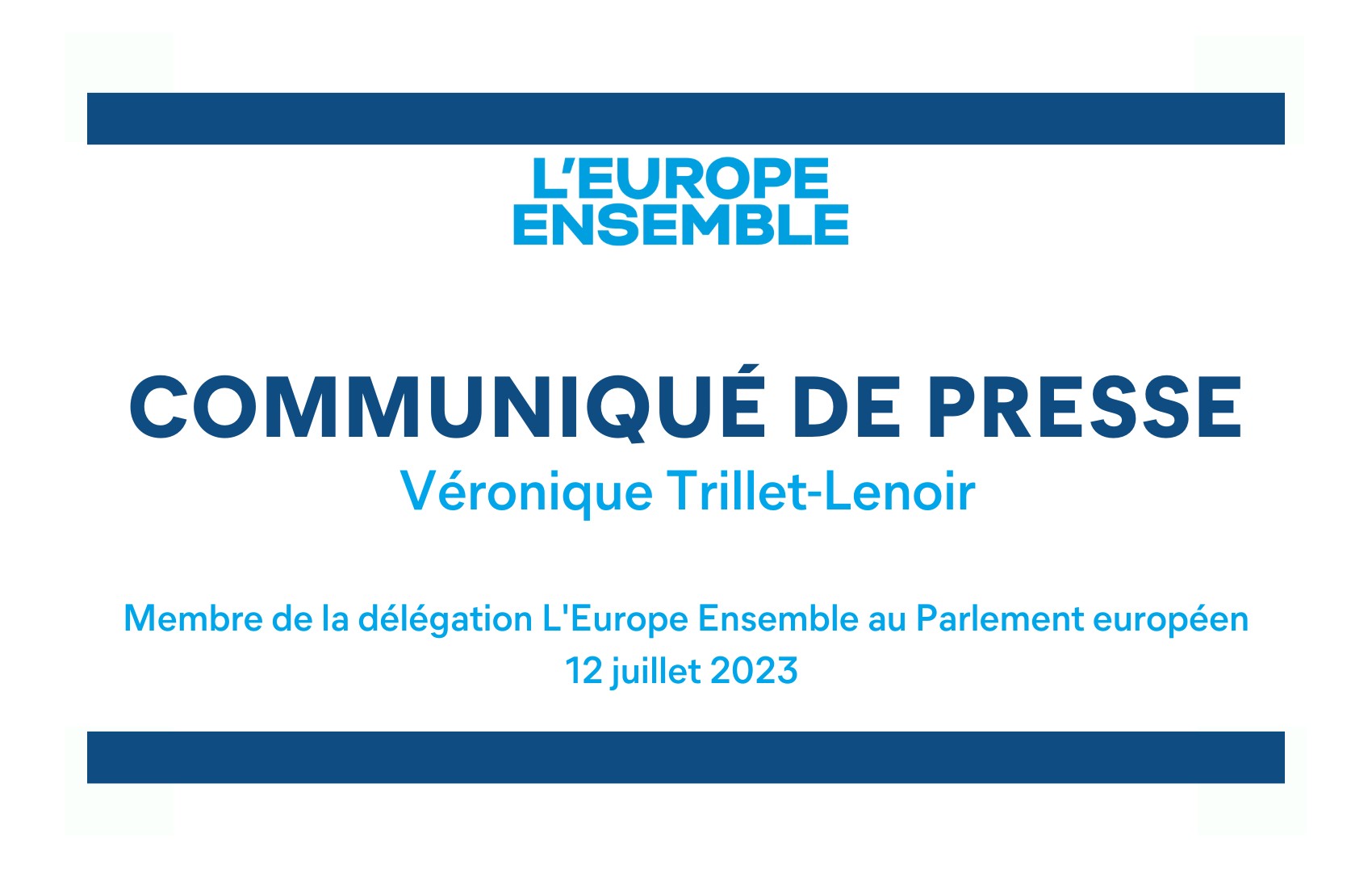Today, the European Commission published Europe’s Beating Cancer Plan. As Rapporteur of the Special Committee on the fight against cancer, Véronique Trillet-Lenoir welcomes this ambitious response to the millions of European citizens affected by cancer in many different ways.
“This European Strategy addresses the claim for progress made by the families of the 1.3 million people who die from cancer each year in Europe including 6000 children and the crucial needs of the 4 million patients currently requiring efficient and innovative treatments. The plan is also an answer to the legitimate expectations of more than 12 million cancer survivors facing the difficult return back to a «normal life ” underlines Mrs Trillet-Lenoir.
“Promoting the fight against cancer in all policies and in all fundings is the best approach. With a budget of 4 billion euros, from EU4Health, Horizon Europe, Digital Europe, Erasmus + and cohesion policy funds, the plan will earmark concrete and ambitious actions in health, research but also in environment, agriculture and mobility domains ” considers the Vice- Coordinator of the Renew Europe group in the environment, public health and food safety committee of the European Parliament.
“Cancer is a disease of social injustice. We are unequal in terms of prevention, unequally protected against environmental carcinogens, unequally educated in risky behaviors, unequally armed against disinformation. From one country to another in Europe, we are unequal in terms of rapid access to quality care. Finally, after illness, we are unequal in our abilities to return to work, to financial independence and to a harmonious social and emotional life. These inequalities need to be addressed. For those reasons, I fully support the establishment of a Cancer Inequalities Registry to identify challenges and specific areas of action to guide investments and interventions at EU and national levels.” adds the MEP.
“Putting research, innovation and new technologies at the service of cancer prevention and care is one of our priorities. With the strong support of the Horizon Europe Cancer Mission, the EU will be able to strengthen research and innovation through the development of existing and new structures. In addition, the creation of new digital tools, such as the European Cancer Imaging Initiative, the European Health Data Space and the strengthening of the European Cancer Information System should allow us to use the clear potential impact of Artificial Intelligence applied to Big data for cancer diagnosis and treatment in the coming years.
Valid and useful findings rely on independent, adequately financed and cross-sectoral, highly cooperative cancer research. No stage of the disease should be neglected and all patients (children, adolescent, adults and elderly) should equally benefit from the European research on Cancer” recalls Véronique Trillet-Lenoir.
“More than 40% of all cancers are preventable through coordinated actions on individual, social, environmental and commercial health determinants. The revision of the European Code Against Cancer will be the best tool to inform individuals on how to reduce cancer risks. Ambitious legislative proposals to reduce tobacco and alcohol consumption, to promote healthy diets and physical activity are steps in the right direction. In my opinion, we should propose stronger measures and clear targets to fight against environmental pollution, to ensure health and safety at work, to limit the exposure to carcinogens and mutagens and to take into account the cumulative effect of hazardous chemicals. The Green Deal and the Farm to Fork Strategy have settled a precise calendar of actions which could have been mentioned in this plan.” insists the MEP.
“A new EU Cancer Screening Scheme, the revision and extension of European recommendations on cancer screening, voluntary accreditation and certification programmes for Cancer Centres could reduce significant inequalities remainning in access to quality-assured cancer screening” considers Véronique Trillet-Lenoir.
“The equal access to high standards in cancer care should not be limited to the establishment of an EU Network of Comprehensive Cancer Centres, the creation of new European Reference Networks or to the launch of an Inter-specialty training programmes. The launch of a Knowledge Center on Cancer will facilitate coordination of cancer-related initiatives at EU level, connect ongoing work on best practices implementation and guidelines for screening and treatment.
In addition to a reference to the Pharmaceutical Strategy, I was expecting to see concrete proposals to solve the issues of innovative medicines prices and to medicines shortages. Those two aspects directly affect anticancer drugs. Following the example of group purchases of drugs against CoVID-19, common negotiations on price, diversification of manufacturing within the EU, strong monitoring of tensions or shortages of medicines and the establishment of a strategic reserve of anticancer drugs are options the EU needs to consider.
The regulation on clinical trials will also have to be fully implemented to finally allow administrative simplification of European clinical trials. We will also have to convince Member States of the need for a common assessment of medicines by reaching an agreement on the Health Technology Assessment (HTA) regulation, which negotiations are blocked by the Council” adds the Member.
“The Commission has decided to dedicate a specific part of the plan to Pediatric Cancers. I fully support this approach, especially the proposed Cancer Survivor Passport and EU Network of Youth Cancer Survivors. The long-awaited announcement of the review of European legislation on pediatric and orphan drugs by the first quarter of 2022 is excellent news. Nevertheless, I would have been interested to know specifically what kind of measures the Commission intends to propose to overcome the weaknesses of the existing legislation” regrets Véronique Trillet-Lenoir.
“Empowering patients should be the main aim of this strategy. In addition to the initiatives introduced by the Commission, the EU should adopt a European Charter of Cancer Patients’ Rights. This Charter could define the rights of cancer patients at each stage of their care journey, from the initial diagnosis to the end of treatment. It would apply equally to every European citizens regardless of the country or region in which they live.
For instance, too many insurers and banks indefinitely take into account the medical history of people who were affected by cancer. To put an end to this “double punishment”, the 27 Member States should implement the “right to be forgotten” after cancer cure” concludes the MEP.



